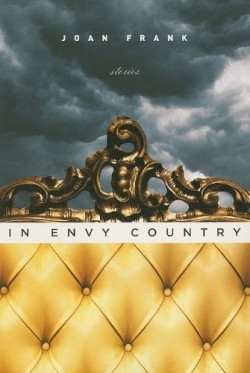In Envy Country
Stories
- 2010 INDIES Winner
- Gold, Short Stories (Adult Fiction)
Literary short story lovers who admire the complex seamless architecture of a muscular sentence will find much to approve in Joan Frank’s collection, In Envy Country. But the author’s precise and artful prose is there to perform a duty; it’s a steadfast craft for a cast of wildly mottled characters. The seas are never calm, and when they momentarily appear so, Frank reveals the outlines of what hovers below. These nine stories, on their face about what is observed, in close-up reveal that what is left undetected, undone, and unimagined is what resonates.
Frank’s stories don’t always seem rooted in an era, but that rarely matters because they take place anytime, all the time. Narrators and protagonists function as mirror, lens, and filter, seemingly telling the stories of people and circumstances around them instead of their own. Yet through that stance, a reader comes to know them. Frank understands the fictive imperative of telling the truth, but slant, and not all of it.
In “Savoir Faire, Savoir Vivre,” Nikki van Klees’s story is told most fully by an unnamed, genderless, and unknowable character whose anonymity somehow manages to add additional credibility to the tale.
The women in “A Note on the Type,” “Betting on Men,” and “In Envy Country” appear to possess somewhat limited self-knowledge, but a well-developed knack for pragmatic survival. They seem to feed off a nuanced scrutiny of the lives of others whom they either admire, disregard, or misunderstand.
Other stories—“Picaro,” “Rearview,” and “A Thing That Happens”—suggest quietly dissatisfied characters who have made a kind of peace with their lot. Yet this puts them at a surprising disadvantage in lives populated by others who are more adrift, though oddly engaging.
In “A Note on the Type,” the narrator trains her focus on a boss who is simultaneously repugnant and earnest. “His shoulders were a little boy’s—narrow and sloping,” she says. “In fact Gerald was the shape of an oversized toddler, including a slight potbelly, which after a while I came to believe was the place he put his longing.”
Throughout, women study men, examine themselves and other women, dissect their own couplings, and other couples. Everyone and everything is on the brink of something, or quite past it. Through freakish combinations of fate and fortitude, readers come to care about these characters who either carry on or systematically combust.
Disclosure: This article is not an endorsement, but a review. The publisher of this book provided free copies of the book to have their book reviewed by a professional reviewer. No fee was paid by the publisher for this review. Foreword Reviews only recommends books that we love. Foreword Magazine, Inc. is disclosing this in accordance with the Federal Trade Commission’s 16 CFR, Part 255.

